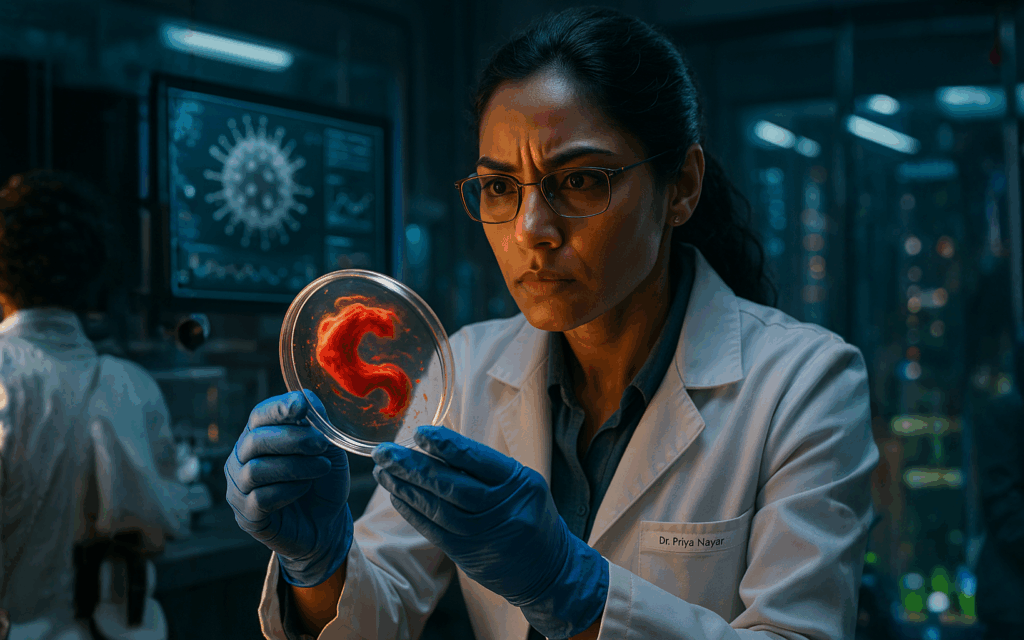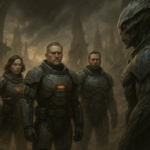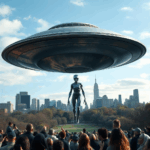The liquid in the petri dish shouldn’t have been red. It definitely shouldn’t have been moving. Dr. Priya Nayar watched with horrified fascination as the crimson droplets coalesced, separated, and reformed-dancing like mercury but with organic purpose. Behind her reflection in the biosafety cabinet’s glass, chaotic evacuation alerts flashed across her laboratory monitors. Outside, Manhattan descended into pandemonium.
“Patient zero just flatlined,” her assistant whispered from the doorway, voice cracking. “And we’ve got similar cases reported in London, Beijing, and So Paulo simultaneously.”
Priya’s hands trembled. Not a random outbreak. Not natural. Not Earth-born. The realization crystallized with terrifying clarity-this was just the beginning.
The Fall
General Marcus Carter stood ramrod straight at the Pentagon’s situation room podium, weathered face betraying nothing despite the apocalyptic data scrolling across the screens. Twenty years in Special Forces had taught him to compartmentalize, but this-this defied compartmentalization.
“Three weeks since initial infection. Estimated casualties approaching eight million. Conventional treatment protocols ineffective,” he announced, voice echoing across the stunned room. “And as of 0600 this morning, we have confirmation: the pathogen is extraterrestrial in origin.”
Murmurs rippled through the assembled military and intelligence brass. Carter nodded to his aide, who projected a grainy satellite image onto the main screen. The vessel-if you could call it that-hung motionless in Earth’s orbit, its obsidian surface absorbing rather than reflecting light. Not hiding. Not threatening. Simply… observing.
“They haven’t responded to any communication attempts,” Carter continued. “But they’re watching. This is a controlled experiment, ladies and gentlemen. And we’re the lab rats.”
Across the globe, hospitals overflowed. The virus-nicknamed “Crimson Tide” for the distinctive hemorrhaging it caused-seemed to attack randomly. Some victims succumbed within hours; others lingered for days. Most peculiar were the rare cases where patients exhibited symptoms, then spontaneously recovered.
In her hastily-assembled BSL-4 bunker beneath Fort Detrick, Priya hadn’t slept in days. Her eyes burned as she reviewed another genetic sequencing report. The virus defied logic-a sophisticated engineering marvel that altered its attack vectors hourly, as if guided by some unseen intelligence.
“It doesn’t make sense,” she muttered, tossing her tablet onto the desk. “The virus is changing too quickly, too purposefully. Almost like-“
“Like it’s being controlled remotely,” finished General Carter, stepping through the airlock. His uniform looked slept in, his eyes bloodshot. “Our analysts think the ship is transmitting continuous updates.”
Priya nodded. “But here’s what’s strange, General. Despite its sophistication, we’re seeing survivors. Not many, but they exist-people who should have died but didn’t.”
Carter’s expression darkened. “They expected a clean sweep. One hundred percent mortality.”
“Exactly. Something about us is… surprising them.”
Aboard the orbital vessel Inevitability, S’thaal examined the holographic projection of Earth with clinical detachment. The swirling red infection vectors were aesthetically pleasing-almost artistic-as they spread across continents. A masterpiece of xenopathological engineering.
“The humans persist longer than expected,” noted his superior, Grand Adjudicator Krell. “Your calculations projected total systemic collapse by cycle fifteen.”
S’thaal’s inner membranes pulsated with irritation. “An anomaly, Adjudicator. Their immune systems are… unpredictable. Some specimens demonstrate unexpected resilience.”
“Resilience is irrelevant. The Cleansing must proceed efficiently. The human infection threatens the galactic equilibrium.”
S’thaal manipulated the hologram, zooming in on North America. “I have initiated Variant Omega. It targets their adaptive immunity directly. No biological system could evolve countermeasures quickly enough.”
Yet doubt flickered in his neural pathways. These humans-chaotic, primitive, violent-had already defied his models twice. An unsettling possibility emerged: what if their very unpredictability was their strength?
The Fight
Priya stared at the blood samples through heavy-lidded eyes. Sixty hours without sleep had left her seeing double, but she couldn’t stop-not when each passing hour meant thousands more deaths. The survivors held the key. Their blood contained something unique, something that fought back against the ever-evolving virus.
“It’s genetic,” she whispered, suddenly alert. “Not a single genetic factor-it’s diversity itself.”
She spun toward her team. “The virus was designed for a homogeneous species! Our genetic variability… humans are the most genetically diverse apex species in our evolutionary record. What if that’s our advantage?”
Carter appeared at her shoulder, having barely left the facility in weeks. “Can you weaponize this insight, Doctor?”
Priya hesitated. “Not weaponize, exactly. But I might be able to accelerate what’s already happening naturally. If I can isolate the recovery patterns and develop a treatment protocol-“
Alarms blared, cutting her off. The facility’s emergency system engaged as external sensors detected an incoming threat.
“They’re here,” Carter growled, drawing his sidearm. “Time’s up, Doctor.”
The ground shook. Not an explosion-something was drilling through the earth above them.
Four hundred feet away, a smooth, metallic sphere had emerged from the ground like a technological tumor, pulsing with faint blue light. Soldiers surrounded it at a distance, weapons trained on its unmarked surface.
Carter approached beside the facility’s security chief. “Thermal signatures?”
“One lifeform, General. Definitely not human.”
As if responding to his words, the sphere’s surface rippled and parted. From within emerged a being so alien that Carter’s mind struggled to process what he was seeing. Vaguely humanoid, but with translucent skin revealing shifting internal structures of impossible complexity. Its limbs moved with liquid grace, and where a face should be, there was only a reflective disc that rippled like mercury.
“I come to observe,” it spoke-not aloud, but directly into the minds of everyone present. “I am S’thaal, Architect of Cleansing.”
Carter’s finger tightened on his trigger. One shot could-
“Your projectile weapons cannot harm me,” S’thaal continued. “And retribution would be… extensive.”
Priya pushed past the security cordon, ignoring Carter’s furious gesture to stay back. “Why are you doing this? What threat could we possibly pose to you?”
The alien’s reflective face rippled, almost thoughtfully. “Not threat. Infection. Your species spreads. Consumes. Destroys. The Collective has modeled your expansion. In eight hundred cycles, you would reach our systems, bringing chaos. We simply accelerate the inevitable.”
“By committing genocide?” Priya challenged.
“By preventing greater suffering. Your species cannot be integrated. Cannot be controlled. Cannot be… homogenized.”
In that moment, a revelation struck Priya with such force that she laughed-a sharp, bitter sound. “That’s it, isn’t it? Our heterogeneity terrifies you. Our differences. Our refusal to conform.”
S’thaal’s surface shimmered, the alien equivalent of a frown. “Your genetic chaos is… unsettling. Dangerous.”
“It’s not chaos,” Priya countered. “It’s adaptation. Evolution. Life finds a way.”
Carter watched this exchange with growing realization. The aliens hadn’t unleashed this plague out of malice or conquest-but fear. Fear of humanity’s unpredictability. Our greatest weakness in their eyes was actually our greatest strength.
In her lab, with S’thaal observing under heavy guard, Priya demonstrated what she’d discovered. “Your virus is elegant, but fundamentally flawed against humans. It can’t account for our immunological variability.”
The alien watched impassively as she displayed infection models. “Impossible. The pathogen adapts continuously.”
“Yes, but it’s centrally controlled-by you, I’m guessing. It follows patterns, algorithms. Human immunity is chaotic, decentralized.” She pulled up genome sequences from survivors. “Look at these natural mutations. Some humans are developing resistance not through central planning but through random variation and selection. Evolution in real-time.”
S’thaal’s form rippled with what might have been concern. “This was… unanticipated.”
“And it gets worse for you,” Priya continued, her exhaustion forgotten in the rush of scientific breakthrough. “The survivors aren’t just resistant-they’re developing antibodies that attack the virus’s control mechanisms. Your own transmission signals are creating a roadmap for our immune systems.”
General Carter, watching from the corner, smiled grimly. “You didn’t just fail to kill us. You’ve given us a vaccine against your own technology.”
S’thaal’s form shuddered. For the first time, the alien seemed uncertain.
The Turning Point
Three months after first contact, humanity had reached the breaking point. Over thirty percent of the global population had perished, infrastructure had collapsed in most regions, and governments operated from bunkers and mobile command centers.
Yet something remarkable was occurring. Survival rates were climbing dramatically. Priya’s treatment protocol-based on synthesized antibodies from natural survivors-had been distributed globally using military and civilian networks. What began as a trickle of recoveries became a flood.
In the war room beneath the Rocky Mountains, Carter briefed what remained of world leadership. “The tide is turning. Reports from all continents show the virus losing effectiveness. Dr. Nayar believes we’ll reach herd immunity within weeks, not years.”
The President-haggard and aged beyond recognition-shook his head in disbelief. “And the aliens?”
“Still watching. Still orbital. But they’ve ceased sending new viral variants. Our guess is they’re reassessing.”
Priya stepped forward, tablet in hand. “There’s more, Madam President. The antibodies we’re developing don’t just fight the virus. They’ve given us insight into alien biology. S’thaal’s presence in our lab provided invaluable data.”
“What kind of data?” asked the Chinese Premier via secure video link.
Priya’s eyes gleamed with fierce determination. “Their biological systems are hyper-standardized-engineered for perfection but with minimal variation. They’re vulnerable to precisely what they tried to use against us. If they attempt physical invasion…”
“We could turn their weapon against them,” Carter finished.
An uneasy silence fell over the assembly. The implication was clear. Humanity now possessed a biological deterrent against their would-be exterminators.
In orbit, S’thaal faced the Collective Council’s holographic projections with what his species recognized as profound discomfort.
“The Cleansing has failed,” declared the Prime Coordinator. “This outcome was calculated as statistically impossible.”
“Their biological systems are… irrational,” S’thaal attempted to explain. “They function through controlled chaos. The very disorder we sought to eliminate became their salvation.”
“And now they possess countermeasures,” another Council member noted ominously. “Your presence among them has compromised Collective security.”
S’thaal’s form undulated with resignation. “They are not what we believed them to be. Not merely destructive, but creative. Not just violent, but resilient. They cooperated across their arbitrary national boundaries to survive. They… adapted.”
“Your assessment?”
“We cannot cleanse them. We cannot contain them. We must… negotiate.”
The Council recoiled at the heretical suggestion. Negotiation with lesser species was unprecedented. Yet the alternative-potential biological vulnerability to a species they had failed to exterminate-was unthinkable.
“You will return to their surface,” the Prime Coordinator finally declared. “You will establish communication protocols. You will ensure they understand the consequences of transgressing beyond their world. This is your penance, Architect.”
S’thaal accepted without protest. Secretly, a most un-Collective emotion flickered through his neural pathways: curiosity.
The Resolution
One year after the virus first appeared, representatives from all nations gathered in the newly constructed United Earth Headquarters in Geneva. The glass and steel structure, rising from the ruins of the old United Nations office, symbolized humanity’s rebirth. Through adversity, ancient enemies had found common cause. Borders remained, but the concept of a unified human species had taken root.
Priya adjusted her formal attire uncomfortably. After a year in lab coats and hazmat suits, wearing ceremonial dress felt alien. Beside her, General Carter-now Secretary of Defense-looked equally uncomfortable in his diplomatic uniform.
“Never thought we’d be here,” he murmured. “Negotiating instead of fighting.”
Priya smiled thinly. “Science won this war, not weapons.”
“Science was our weapon,” he countered. “The best kind.”
The chamber hushed as S’thaal and three other alien representatives entered. Unlike their first encounter, the aliens now wore containment suits-not to protect themselves, but to prevent biological exposure. The power dynamic had shifted dramatically.
Earth’s newly elected Secretary-General approached the podium. “We gather today to formalize the Treaty of Coexistence between humanity and the Collective. After great suffering on our part, and great miscalculation on theirs, we have reached understanding.”
S’thaal stepped forward. His communication had become more nuanced over months of interaction, almost emotional by his species’ standards. “The Collective acknowledges error in assessment of human potential. We sought to prevent a threat that existed only in probability, not reality.”
“And nearly committed genocide in the process,” Carter muttered under his breath.
The alien continued, unperturbed. “We offer technology exchange as reparation. Medical advances. Clean energy. Not as conquest tools, but adaptation tools.” A pause. “We have much to learn from each other.”
Priya listened with mixed emotions. The alien plague had killed over two billion humans. No technology could compensate for such loss. Yet humanity had not only survived-it had emerged stronger, more unified, and with new understanding of both its fragility and its remarkable resilience.
As the formal treaty signing proceeded, she slipped away to the observation deck. The night sky above Geneva was clear, stars twinkling alongside the now-visible alien vessels that had decloaked as part of the agreement.
Carter joined her, offering a glass of champagne. “Thinking about the future, Doctor?”
“About evolution,” she replied. “Natural selection. The universe threw its best punch at us, and we’re still standing.”
He nodded slowly. “They thought homogeneity was strength. Uniformity, conformity, predictability.”
“And we proved that diversity-of genes, of ideas, of approaches-is humanity’s superpower.” She raised her glass. “To chaos theory.”
“To beautiful, messy humanity,” Carter countered, clinking his glass against hers.
Behind them, through the window, Earth continued its eternal rotation-scarred, diminished, but unbroken. And for the first time in human history, united in its magnificent diversity.
Epilogue
S’thaal stood in Dr. Nayar’s laboratory, watching her examine a culture sample. After two Earth years of diplomatic service, he had developed what his species would consider a dangerous level of individuality.
“Your genome splicing techniques continue to fascinate,” he observed. “Creating deliberate variations rather than seeking perfection-it contradicts all Collective principles.”
Priya glanced up, still finding it difficult to read emotion in the alien’s reflective countenance. “That’s because you engineered out your capacity for randomness. You chose stability over adaptability.”
“A choice made eons ago,” S’thaal acknowledged. “Perhaps… not irreversible.”
She set down her instruments, studying him curiously. “Are you suggesting the Collective might change its fundamental philosophy? Because of us?”
“Some already question our path. Your species survived what was designed to be unsurvivable. It provokes… reconsideration.”
Outside, Earth was rebuilding. New cities rose with Collective technology but human creativity. The casualty count had been catastrophic, but birth rates had skyrocketed in the aftermath-life asserting itself as it always had.
“We’re going to the stars now,” Priya said quietly. “Not in conquest as you feared, but in exploration. Carrying our chaos with us.”
“Yes,” S’thaal replied. “And the universe will never be the same.”
Neither, he left unspoken, would the Collective. For in attempting to eliminate the human infection, they had instead become infected themselves-with something far more insidious than any virus.
They had been infected with doubt. With curiosity. With the dangerous idea that perhaps perfection wasn’t found in uniformity, but in diversity.
And like humanity itself, this idea would prove impossible to exterminate.


